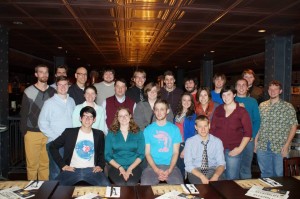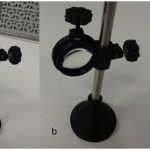 Students and faculty attending the Materials Science & Technology 2013 Conference and Exhibition (MS&T 2013) in Montreal, Quebec, Canada, on October 27-31, 2013, posted two photo albums to the Facebook page of Michigan Tech Materials Science and Engineering.
Students and faculty attending the Materials Science & Technology 2013 Conference and Exhibition (MS&T 2013) in Montreal, Quebec, Canada, on October 27-31, 2013, posted two photo albums to the Facebook page of Michigan Tech Materials Science and Engineering.
 The work of the lab team run by Paul Sanders (MSE) and Joshua Pearce (MSE/ECE), which developed the open-source 3-D metal printer was covered in the Feb. issue of Desktop Engineering.
The work of the lab team run by Paul Sanders (MSE) and Joshua Pearce (MSE/ECE), which developed the open-source 3-D metal printer was covered in the Feb. issue of Desktop Engineering.
From Tech Today.
In the News
Joshua Pearce (MSE/ECE) was interviewed by SciDevNet on how the developing world can benefit from 3D printing in “3-D printing could offer savings on replica lab kit”.
Two projects from Michigan Tech’s 3D printing program were used as examples in an article published in 3D Printing Industry: “How a Medical Clinic in the Bolivian Rainforest Might Use 3D Printing” and a third was used by Engineering for Change in an article on: “3D printers may be poised to take off in developing countries”.
From Tech Today.
In the News
The interview on appropriate technology and development with Joshua Pearce (MSE/ECE) was picked up by All Africa and The Guardian–the British newspaper, whose online edition is the third most widely read in the world and has a combined print and online readership of about 9 million.
Michigan Tech’s open-source 3D metal printer was covered in an article “Free Form Metal 3D Printer is a 3Doodler on Steroids,” by 3D Printing Industry.
From Tech Today.
3D printing could offer developing world savings on replica lab kit
This and similar advances mean the age of appropriate technology – affordable, sustainable solutions designed and built to meet local needs – may be here, argues Joshua Pearce, a materials science and engineering professor at Michigan Technological University in the US, in an article in last month’s Physics World magazine.
The idea of appropriate technology to deal with poverty was used as early as the 1970s by the World Health Organisation (WHO), when villagers were encouraged to make water pumps and farming tools. But 3D printing has given the concept a boost, Pearce says.
The WHO’s efforts worked well, he says, but took in only one village at a time. “There was incredibly wasteful duplication of effort to solve nearly identical problems all throughout the world.”
Read more at Guardian development network.
